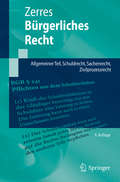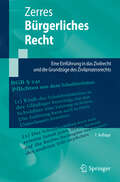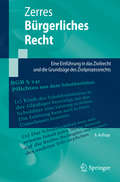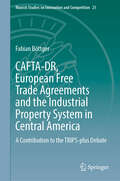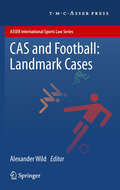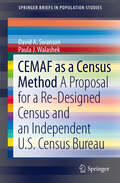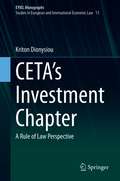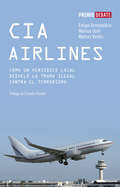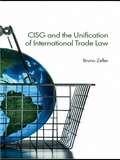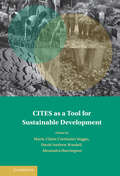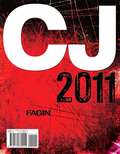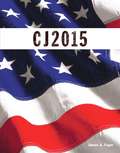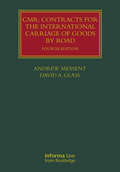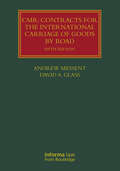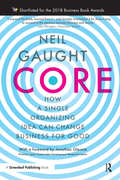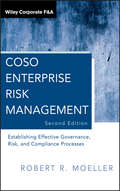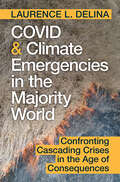- Table View
- List View
Byzantine Legal Culture and the Roman Legal Tradition, 867–1056
by Zachary ChitwoodThis social history of Byzantine law offers an introduction to one of the world's richest yet hitherto understudied legal traditions. In the first study of its kind, Chitwood explores and reinterprets the seminal legal-historical events of the Byzantine Empire under the Macedonian dynasty, including the re-appropriation and refashioning of the Justinianic legal corpus and the founding of a law school in Constantinople. During this last phase of Byzantine secular law, momentous changes in law and legal culture were underway: the patronage of the elite was reflected in the legal system, theological terms from Orthodox Christianity entered the vocabulary of Byzantine jurisprudence, and private legal collections of uncertain origins began to circulate in manuscripts alongside official redactions of Justinianic law. By using the heuristic device of exploring legal culture, this book examines the interplay in law between the Roman political heritage, Orthodox Christianity and Hellenic culture.
Bürgerbeteiligung an der Verwaltung am Beispiel der Hamburgischen Deputationen: Veraltete Beteiligungsform oder bewährtes Mitwirkungsinstrument
by Stephan MeynDieses Buch beleuchtet das althergebrachte Verwaltungsgremium der Hamburgischen Deputationen im verwaltungswissenschaftlichen, historischen, rechts- sowie politikwissenschaftlichen Kontext. Als zentrale Frage wird untersucht, ob die Deputationen in ihrer bis zum Ende der 21. Legislaturperiode bestehenden Form ihre Daseinsberechtigung hatten, welchen historischen Ursprungs sie waren, welchen Reformbedarf es gab und ob sie der Verfassungsvorgabe in Artikel 56 der Hamburgischen Verfassung (a. F.), das Volk an der Verwaltung mitwirken zu lassen, entsprachen. Hierzu wird einerseits eine umfassende quantitative Erhebung mit Hilfe eines standardisierten Fragebogens unter den Deputierten durchgeführt und durch eine qualitative Erhebung in Form von Leitfadeninterviews ergänzt. Andererseits werden die historischen Wurzeln seit dem späten Mittelalter und die Entwicklungen bis zur Gegenwart herausgearbeitet sowie die Rechtslage vor dem Hintergrund der Verfassungsgeschichte und -wirklichkeit auch im Vergleich zu anderen deutschen Ländern dargestellt.
Bürgerbeteiligung und Verwaltungspraxis: Langzeitevaluationen der Auswirkungen von Beteiligungsregelungen in Baden-Württemberg (Politik gestalten - Kommunikation, Deliberation und Partizipation bei politisch relevanten Projekten)
by Silke I. Keil Jan Ziekow Ingo Hamann Friederike Bickmann Lucia Scharpf Katharina BührenDieses Buch thematisiert die Beteiligung von Bürger*innen bei Planungs- und anderen umweltrelevanten Vorhaben in Baden-Württemberg. Im Rahmen der Intensivierung der Beteiligung von Bürger*innen wurde ab 2014 in Baden-Württemberg mithilfe der Regelungen der Verwaltungsvorschrift Öffentlichkeitsbeteiligung, des zugehörigen Leitfadens für eine neue Planungskultur sowie des Umweltverwaltungsgesetzes eine neue, bundesweit bis dahin einmalige Beteiligungskultur gestartet. Der Band überprüft und bewertet anhand einer langfristigen begleitenden Evaluation die Erreichung der intendierten Ziele der Beteiligungsregelungen sowie die für die Verwaltungen entstehenden Aufwände.
Bürgerliches Recht: Allgemeiner Teil, Schuldrecht, Sachenrecht, Zivilprozessrecht (Springer-Lehrbuch)
by Thomas ZerresDie neunte Auflage deckt die wesentlichen Inhalte des zivilrechtlichen Lehrstoffes ab. Es werden in kompakter Form der Allgemeine Teil des BGB, das (Allgemeine und Besondere) Schuldrecht sowie das Sachenrecht dargestellt. Vervollständigt wird dieses Buch mit einem abschließenden Kapitel zum Zivilprozessrecht. Geschult werden das Verständnis für die Strukturen und Zusammenhänge im Bürgerlichen Recht und das Verständnis für die Verbindungen mit dem Zivilprozessrecht. Eine Vielzahl von Beispielen aus der Praxis, einprägsame Illustrationen, zahlreiche Schemata und Fälle mit Lösungsvorschlägen ermöglichen damit gleichzeitig auch ein anwendungsorientiertes bzw. fallorientiertes Lernen. Seine inhaltliche Kompaktheit macht es so zu einem idealen studienbegleitenden Lehrbuch für Studierende an Universitäten, Hochschulen, Berufsakademien und anderen Bildungseinrichtungen.
Bürgerliches Recht: Allgemeiner Teil, Schuldrecht, Sachenrecht, Zivilprozessrecht (Springer-Lehrbuch)
by Thomas ZerresDie nun vorliegende vollständig überarbeitete und aktualisierte zehnte Auflage des bewährten Lehrbuches deckt die wesentlichen Inhalte des zivilrechtlichen Lehrstoffes ab. Es werden in kompakter Form der Allgemeine Teil des BGB, das (Allgemeine und Besondere) Schuldrecht sowie das Sachenrecht dargestellt. Vervollständigt wird dieses Buch mit einem abschließenden Kapitel zum Zivilprozessrecht. Geschult werden das Verständnis für die Strukturen und Zusammenhänge im Bürgerlichen Recht und das Verständnis für die Verbindungen mit dem Zivilprozessrecht. Eine Vielzahl von Beispielen aus der Praxis, einprägsame Illustrationen, zahlreiche Schemata und Fälle mit Lösungsvorschlägen ermöglichen damit gleichzeitig auch ein anwendungsorientiertes bzw. fallorientiertes Lernen. Seine inhaltliche Kompaktheit macht es so zu einem idealen studienbegleitenden Lehrbuch für Studierende an Universitäten, Hochschulen, Berufsakademien und anderen Bildungseinrichtungen.
Bürgerliches Recht: Eine Einführung in das Zivilrecht und die Grundzüge des Zivilprozessrechts (Springer-Lehrbuch)
by Thomas ZerresDas kompakte Lehrbuch eignet sich für Studierende an Universitäten, Fachhochschulen und anderen Bildungseinrichtungen sowohl als Einstieg in das Bürgerliche Recht als auch im weiteren Verlauf des Studiums zur Wiederholung. Eine Vielzahl von Beispielen aus der Praxis und einprägsame Illustrationen machen in eingängiger Erläuterung vertraut mit den ersten drei Büchern des Bürgerlichen Gesetzbuches sowie den Grundzügen der Zivilprozessordnung. Geschult werden das Verständnis für die Strukturen und Zusammenhänge im Bürgerlichen Recht und das Verständnis für die Verbindungen mit dem Zivilprozessrecht.
Bürgerliches Recht: Eine Einführung in das Zivilrecht und die Grundzüge des Zivilprozessrechts (Springer-Lehrbuch)
by Thomas ZerresDas kompakte Lehrbuch eignet sich für Studierende an Universitäten, Fachhochschulen und anderen Bildungseinrichtungen sowohl als Einstieg in das Bürgerliche Recht als auch im weiteren Verlauf des Studiums zur Wiederholung. Eine Vielzahl von Beispielen aus der Praxis und einprägsame Illustrationen machen in eingängiger Erläuterung vertraut mit den ersten drei Büchern des Bürgerlichen Gesetzbuches sowie den Grundzügen der Zivilprozessordnung. Geschult werden das Verständnis für die Strukturen und Zusammenhänge im Bürgerlichen Recht und das Verständnis für die Verbindungen mit dem Zivilprozessrecht. Die vorliegende 8. Auflage wurde, unter Beibehaltung der bewährten Konzeption, vollständig überarbeitet und aktualisiert.
C.S. Lewis on Politics and the Natural Law
by Justin Buckley Dyer Micah J. WatsonConventional wisdom holds that C. S. Lewis was uninterested in politics and public affairs. The conventional wisdom is wrong. As Justin Buckley Dyer and Micah J. Watson show in this groundbreaking work, Lewis was deeply interested in the fundamental truths and falsehoods about human nature and how these conceptions manifest themselves in the contested and turbulent public square. Ranging from the depths of Lewis' philosophical treatments of epistemology and moral pedagogy to practical considerations of morals legislation and responsible citizenship, this book explores the contours of Lewis' multi-faceted Christian engagement with political philosophy generally and the natural-law tradition in particular. Drawing from the full range of Lewis' corpus and situating his thought in relationship to both ancient and modern seminal thinkers, C. S. Lewis on Politics and the Natural Law offers an unprecedented look at politics and political thought from the perspective of one of the twentieth century's most influential writers.
CAFTA-DR, European Free Trade Agreements and the Industrial Property System in Central America: A Contribution to the TRIPS-plus Debate (Munich Studies on Innovation and Competition #21)
by Fabian BöttgerThis book analyses the impact of CAFTA-DR and European Free Trade Agreements on the industrial property system in Central America. While there is ample literature on bilateral and regional FTAs, it is often limited to the contractual obligations assumed by the participating countries. This book goes a step further and analyses how these obligations are implemented through national legislation, institutional changes and legal practice. To provide a deeper understanding of the effects of FTAs on national IP systems, the book addresses research questions that go beyond general publications on the topic. Research questions include: Is the combination of market access and IP rules in a bilateral FTA an effective and appropriate trade deal? How are the IP requirements under the FTAs implemented into the national statutory framework? Do the IP rules of FTAs sufficiently address institutional factors necessary for an effective IP system? Do they provide for an appropriate balance between minimum protection and flexibilities and support relevant IP policy objectives? The book covers the CAFTA-DR member states Costa Rica, the Dominican Republic, El Salvador, Guatemala, Honduras and Nicaragua, reviewing the implementation of FTA obligations regarding patents, plant varieties, test data, trademarks, geographical indications, designs, genetic resources and traditional knowledge, enforcement and other areas. By looking at several countries, a broad range of IP rights and the practical implementation of FTA obligations, this book provides a broad range of information and insights.
CAS and Football: Landmark Cases (ASSER International Sports Law Series)
by Alexander WildFIFA has accepted the jurisdiction of the CAS as from 11 November 2002. This date does not mark the beginning of the arbitration of the CAS in football matters, however it has to be stated, that from this date on football disputes in front of the CAS increased enormously. This book is dedicated to the most important decisions of the CAS in football disputes. These awards are analyzed by experts, practicing all over the world. Most of the authors have been directly involved in the proceedings before the CAS. The commentaries cover a broad spectrum of disputes, inter alia, disputes concerning the contractual stability, protection of young football players, doping, football hooliganism, match fixing, players release, multiple club ownership, player agents and the stays of execution. This book provides a wide range of valuable information and is a useful tool for those whose main concern is professional football, such as sports lawyers, sports managers and sports agents, but also academics and researchers. The book appears in the ASSER International Sports Law Series, under the editorship of Dr. Robert Siekmann, Dr. Janwillem Soek and Marco van der Harst LL.M.
CEMAF as a Census Method: A Proposal for a Re-Designed Census and An Independent U.S. Census Bureau (SpringerBriefs in Population Studies)
by David A. Swanson Paula J. WalashekIn provocative terms that push the envelope of technical, administrative, and legal capabilities, Swanson and Walashek propose a re-vamped US census based neither on the current system, self-enumeration, nor its predecessor, door-to-door canvassing. Instead, they propose that it be built on a combination of four elements: (1) administrative records; (2) the continuously updated Master Address File; (3) survey data; and (4) modeling and imputation techniques. They use "Census-Enhanced Master Address File (CEMAF) as a descriptive term for their proposal, which is based on four principles and includes a proposal for an independent Census Bureau. They argue that evidence suggests that the methods used to conduct traditional census counts may be at the end of their useful working lives, as evidenced by increasing costs and declining response rates. Some of their ideas will seem farfetched. However, Swanson and Walashek believe this is the time to discuss radical proposals as governments re-examine the utility of traditional census counts and consider reductions, as is the case in Canada and England. This SpringerBriefs should be on the reading list of staff in statistical agencies grappling with rising costs and declining response rates, as well as census stakeholders concerned about costs, accuracy, and census utility.
CEO Leadership: Navigating the New Era in Corporate Governance
by Thomas A. ColeCorporate governance for public companies in the United States today is a fragile balance between shareholders, board members, and CEOs. Shareholders, who are focused on profits, put pressure on boards, who are accountable for operations and profitability. Boards, in turn, pressure CEOs, who must answer to the board while building their own larger vision and strategy for the future of the company. In order for this structure to be successful in the long term, it is imperative that boards and CEOs come to understand each other’s roles and how best to work together. Drawing on four decades of experience advising boards and CEOs on how to do just that, Thomas A. Cole offers in CEO Leadership a straightforward and accessible guide to navigating corporate governance today. He explores the recurring question of whose benefit a corporation should be governed for, along with related matters of corporate social responsibility, and he explains the role of laws, market forces, and politics and their influence on the governance of public companies. For corporate directors, he provides a comprehensive examination of the roles, responsibilities, and accountability the role entails, while also offering guidance on how to be as effective as possible in addressing both routine corporate matters and special situations such as mergers and acquisitions, succession, and corporate crises. In addition, he offers practical suggestions for CEOs on leadership and their interactions with boards and shareholders. Cole also mounts a compelling case that a corporate culture that celebrates diversity and inclusion and has zero tolerance for sexual misconduct is critical to long-term business success. Filled with vignettes from Cole’s many years of experience in the board room and C-suite, CEO Leadership is an invaluable resource for current and prospective directors, CEOs, and other senior officers of public companies as well as the next generation of corporate leaders and their business and financial advisors.
CETA's Investment Chapter: A Rule of Law Perspective (European Yearbook of International Economic Law #13)
by Kriton DionysiouThis book provides a comprehensive account of the CETA Investment Chapter’s ability to overcome the legitimacy crisis facing investment arbitration. To do so, it first examines the root causes behind the legitimacy crisis, ultimately arguing that it reflects a fundamental rule of law crisis within investment arbitration. In particular, it asserts that the normative standpoints of the legitimacy crisis form part of the rule of law, the uniting legal principle from which the legitimacy concerns stem. The book contends that the rule of law is not only the principal normative and causal assumption on which the legitimacy concerns are based, but that it could also be utilized as a platform to evaluate the investment arbitration mechanism in CETA's Investment Chapter.Based on this, the book evaluates CETA's Investment Chapter through the rule of law framework in order to provide a convincing account of the latter's ability to overcome the legitimacy crisis facing investment arbitration. It concludes that CETA's Investment Chapter is unlikely to completely solve the legitimacy crisis simply because it is just a patchwork of reforms rather than a comprehensive reinvention of the substantive and procedural law of investment arbitration. Lastly, the book offers meaningful insights into the way the challenges presented by investment arbitration should be addressed. The book is intended for academics researching international investment law and arbitration as well as for policy-makers focusing on reforming investor-state dispute settlement.
CIA Airlines: Cómo un periódico de provincias desveló la trama ilegal contra el terrorismo
by Felipe Armendáriz Marisa Goñi Matías VallésPREMIO DEBATE El 6 de septiembre de 2006 el presidente Bush admitía públicamente la existencia de una red de prisiones secretas organizadas por la CIA. Así culminaba en parte una odisea periodística que comenzó casi un año y medio antes, el 12 de marzo de 2005, cuando Diario de Mallorca titulaba a toda página «La CIA utiliza Son Sant Joan como base de su avión cárcel». Desde entonces las noticias sobre los vuelos de la CIA a través de territorio europeo, en los que presuntamente se trasladaron ilegalmente sospechosos de terrorismo islámico, no han abandonado las primeras páginas de los periódicos. Y detrás de las querellas ante la Audiencia Nacional, los informes del Parlamento Europeo y las portadas del New York Times, está el trabajo de tres periodistas de Diario de Mallorca, que desde un medio regional han llevado a cabo una sobresaliente investigación, merecedora del primer premio Debate de libro reportaje, que ha destapado las oscuras maniobras de los servicios de inteligencia estadounidenses en la «Guerra contra el Terror». En este fascinante libro, el equipo de Diario de Mallorca que sacó a la luz el asunto cuenta la historia de los aviones prisión de la CIA en España, con especial énfasis en el papel de Mallorca y con una mirada a las repercusiones mediáticas mundiales y a la aparición en la era de Internet de un nuevo periodismo no sólo en la difusión, sino sobre todo en la elaboración de las noticias.
CISG and the Unification of International Trade Law
by Bruno ZellerPushing the boundaries between domestic and unified laws, this book explores the differences between unification and harmonization. Bruno Zeller provides a critical examination of the Convention for the International Sale of Goods (CISG), the advances of international jurisprudence and the role of domestic courts, in order to consider whether unification is merely a myth or a reality. Describing the salient features of unification and harmonization and using the CISG as a vehicle to test unification attempts, this volume touches on controversial points and fosters debates upon efforts to unify laws in discrete areas. It examines the assumption that the creation of a convention introduces a uniform law, which then contributes to the harmonization of international laws. Provocative, this is a must read for postgraduates and researchers studying and working in the fields of comparative and international trade law.
CITES as a Tool for Sustainable Development (Treaty Implementation for Sustainable Development)
by Alexandra Harrington Segger, Marie-Claire Cordonier David Andrew WardellSaving endangered species presents a critical and increasingly pressing challenge for conservation and sustainability movements, and is also matter of survival and livelihoods for the world's poorest and vulnerable communities. In 1973, a global Convention on International Trade in Endangered Species (CITES) was adopted to stem the extinction of many species. In 2015, as part of the Sustainable Development Goals (SDG 15) the United Nations called for urgent action to protect endangered species and their natural habitats. This volume focuses on the legal implementation of CITES to achieve the global SDGs. Activating interdisciplinary analysis and case studies across jurisdictions, the contributors analyse the potential for CITES to promote more sustainable development, proposing international and national regulatory innovations for implementing CITES. They consider recent innovations and key intervention points along flora and fauna value chains, advancing coherent recommendations to strengthen CITES implementation, including through the regulation of trade in endangered species globally and locally.
CJ 2011
by James A. FaginWritten for today's student, CJ 2011 provides a brief and affordable look at the criminal justice system. Taking a more contemporary approach, it supports true understanding by focusing on the core concepts that matter most. Each chapter features a unified presentation that links learning objectives, text segments, media explorations and end-of-chapter summaries together.
CJ2015
by James A. FaginCJ 2015 provides an affordable, thought-provoking look at the criminal justice system that uses clear writing and eye-catching visuals to get your students straight to the important concepts. By focusing on these core concepts, students will gain true understanding of the material, without becoming overwhelmed with unnecessary information. The book's conversation-starting pedagogy encourages active participation in learning, moving students beyond memorization by engaging them in the latest research findings and current events shaping the field.
CJ2: A Student-tested, Faculty Approved Approach To Learning Criminal Justice
by Larry Gaines Roger MillerNIMAC-sourced textbook <P><P>Designed for, and in partnership with, today's learners, CJ2 was developed to offer you a shorter, more affordable book…that you will actually WANT to read. The concise, magazine-style format includes all of the key concepts you'll need to learn and a full suite of study tools to accommodate your busy lifestyle--including videos, games, chapter-by-chapter study cards, self-quizzes, downloadable flash cards, and more.
CJ: Realities and Challenges
by Ruth E. Masters Candice A. Skrapec Bernadette T. Muscat Lester Pincu Phyllis B. Gerstenfeld Michael Hooper Lori Beth Way John P. J. DussichCJ: Realities and Challenges encourages students to think critically about the realities and challenges of the criminal justice system. Using the text's framework of Observe, Investigate and Understand, students learn to recognize the myths and interpret the facts underlying the American criminal justice system and gain greater understanding of its complexities. CJ: Realities and Challenges brings together the insights of an author team of practitioners and scholars to present a contemporary and realistic perspective on a vital institution in American Society.
CMR: Contracts for the International Carriage of Goods by Road (Lloyd's Shipping Law Library)
by Andrew Messent David GlassNow in its fourth edition, this hallmark text provides a comprehensive, article-by-article guide to the workings of the CMR Convention, as incorporated into English Law by the Carriage of Goods by Road Act 1965. This new edition is fully up to date with all major UK case law, plus major developments in the interpretation of the Convention in the case law of other Contracting States. Furthermore, the book includes expert guidance on the amendments introduced by the additional protocol concerning the electronic consignment note of 2008. The relationship between CMR and potentially conflicting legislation, in particular the Judgments Regulation of 2001 and the Judgments Regulation (recast) of 2012, are also usefully examined. Praised as well-written and extremely accessible, Messent and Glass offer a level of expert detail and referencing that cannot be found elsewhere. This work is an invaluable reference tool that can be used by the busy legal practitioner, and by other road haulage industry professionals, in any contracting state, to solve the issues that confront them in daily practice. It is also an indispensable guide for academics and students of the international carriage of goods by road.
CMR: Contracts for the International Carriage of Goods by Road (Lloyd's Shipping Law Library)
by Andrew Messent David A. GlassNow in its fifth edition, this hallmark text provides a comprehensive, article-by-article guide to the workings of the CMR Convention, as incorporated into English Law by the Carriage of Goods by Road Act 1965.Fully revised throughout, the book offers a complete update of relevant English cases, including the latest Supreme Court decision on the subject, and draws in major developments in the interpretation of the Convention in the case law of other Contracting States. Furthermore, this new edition incorporates two key developments to ensure the book’s continuing currency and authority. Firstly, it reviews the operation of the current law following the UK’s ratification of the Additional Protocol to the Convention on the Contract for the International Carriage of Goods by Road (CMR) 2008, which provides for the recognition and use of electronic consignment notes, ie e-CMR. Secondly, it addresses the changes consequent on Brexit which affect aspects of the general legal context and whose relationship with the rules of CMR require re-examination, principally in respect of the law governing issues of choice of law, jurisdiction and enforcement of court judgments. Clearly and accessibly written, Messent and Glass continue to offer a level of expert detail and referencing that cannot be found elsewhere.The book is an invaluable reference tool that can be used by the busy legal practitioner, and by other road haulage industry professionals, in any contracting state, to solve the issues that confront them in daily practice. It is also an indispensable guide for academics and students of the international carriage of goods by road.
CORE: How a Single Organizing Idea can Change Business for Good
by Neil GaughtCORE is shortlisted for the Best Business Book Awards in the Engaging Change category. At the core of the world's most admired businesses lies a powerful Single Organizing Idea. These organizations deliver sustainable economic and social benefit; they unite people, attract investment, inspire innovation, pioneer new efficiencies, and enjoy positive reputation. Such businesses are admired but they remain a rare breed. Though the tides of change are engaging the minds of business leaders, most are still trapped behind their brands and an approach to corporate social responsibility that is out of step with a connected society that increasingly questions 'who' these businesses really are and what drives their purpose. This book is about how businesses can adopt a Single Organizing Idea and, more importantly, why they have to. Drawing on stories and case studies, and with reference to the UN's Sustainable Development Goals, its no-nonsense approach sets aside the ideals to confront the realities of business reform. It demonstrates the power and potential that a Single Organizing Idea can bring to any business prepared to take its head out of the sand and proactively respond to today's challenges.
COSO Enterprise Risk Management: Establishing Effective Governance, Risk, and Compliance Processes (Wiley Corporate F&A #560)
by Robert R. MoellerA fully updated, step-by-step guide for implementing COSO's Enterprise Risk Management COSO Enterprise Risk Management, Second Edition clearly enables organizations of all types and sizes to understand and better manage their risk environments and make better decisions through use of the COSO ERM framework. The Second Edition discusses the latest trends and pronouncements that have affected COSO ERM and explores new topics, including the PCAOB's release of AS5; ISACA's recently revised CobiT; and the recently released IIA Standards. Offers you expert advice on how to carry out internal control responsibilities more efficiently Updates you on the ins and outs of the COSO Report and its emergence as the new platform for understanding all aspects of risk in today's organization Shows you how an effective risk management program, following COSO ERM, can help your organization to better comply with the Sarbanes-Oxley Act Knowledgeably explains how to implement an effective ERM program Preparing professionals develop and follow an effective risk culture, COSO Enterprise Risk Management, Second Edition is the fully revised, invaluable working resource that will show you how to identify risks, avoid pitfalls within your corporation, and keep it moving ahead of the competition.
COVID and Climate Emergencies in the Majority World: Confronting Cascading Crises in the Age of Consequences
by Laurence L. DelinaThe Covid pandemic has amplified the hardships people are experiencing from human-induced climate change and its impact on weather extremes. Those in the Majority World are most effected by such global crises, and the pandemic has exposed the vulnerabilities of these populations while highlighting the differences between them and those fortunate to live in the Minority World. This book presents an overview of the impact of the climate emergency punctuated by a pandemic, discussing the expanding inequalities and deteriorating spaces for democratic public engagement. Pandemic responses demonstrate how future technological, engineering, political, social, and behavioural strategies could be constructed in response to other crises. Using a critical analysis of these responses, this book proposes sociotechnical alternatives and just approaches to adapt to cascading crises in the Majority World. It will be valuable for social science students and researchers, policymakers, and anyone interested in inequality and vulnerability in developing countries.



